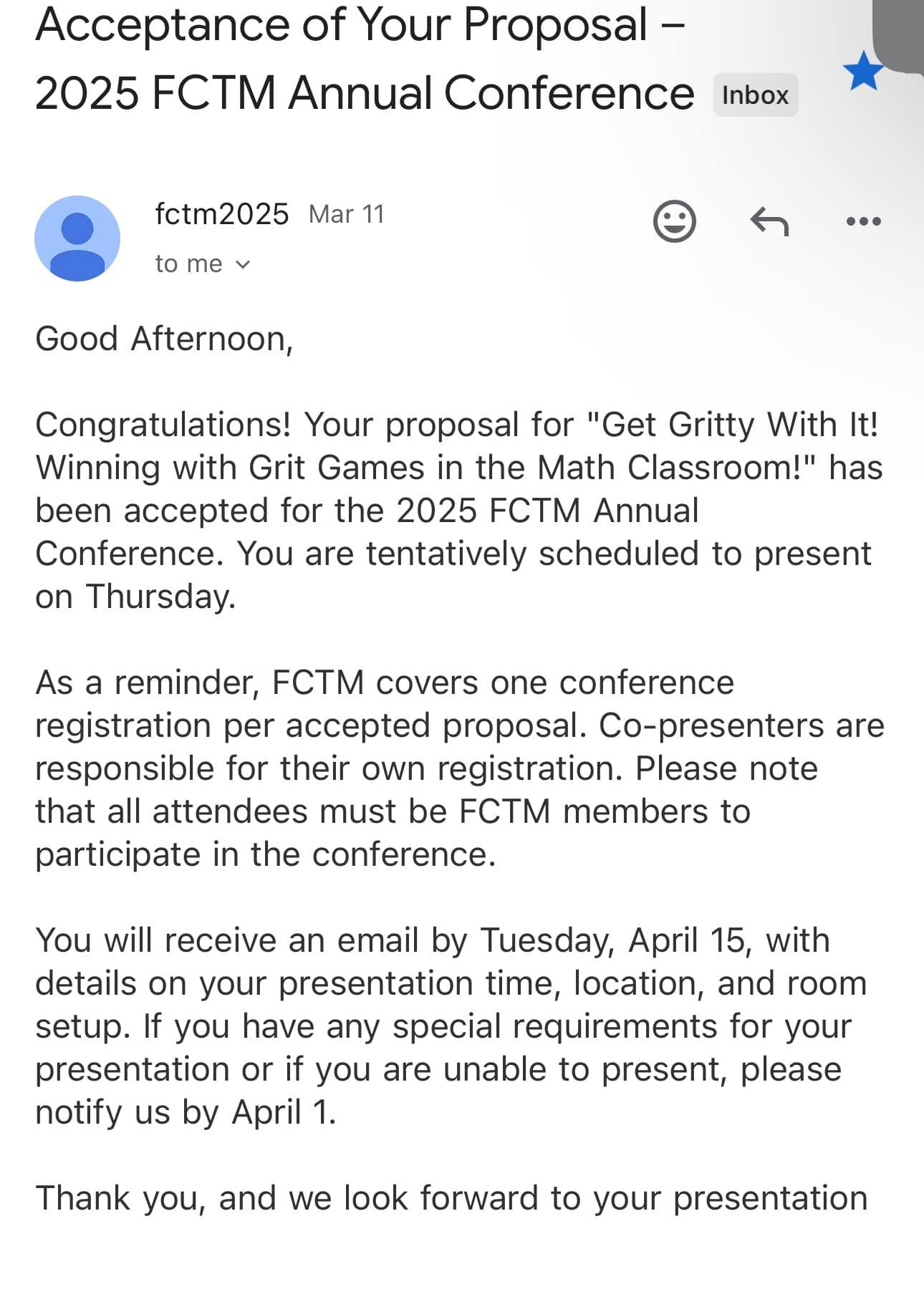Blog Layout
Eliminating the Mindset of "I CAN'T DO MATH" in the Classroom!
India White • June 27, 2023
Eliminating the "I Can't Do Math" Mindset in the Classroom

Eliminating I CAN’T Do Math through Grit!!
As a student, it is common to feel defeated when it comes to math. The subject can be challenging, and it is easy to feel like you are not good enough. Further, some students come from families where math is not a favorable subject, and parents have a fear of math or “math phobia”. However, having a defeated mindset can hinder your progress and prevent you from achieving your goals. The good news is that you can eliminate this mindset of “I Can’t Do Math” through implementing a growth mindset through grit in the math classroom.
Grit is the ability to persevere through challenges and setbacks. It is the determination to keep going even when things get tough. In the math classroom, grit is essential for success. Students who understand how to master a growth mindset and remain gritty when the math gets tough can eliminate the opinion they possess of “I can’t do math” in the classroom. Here are some tips on how to develop grit and eliminate a defeated mindset:
1. Embrace the struggle of math during learning
Math is not easy, and it is okay to struggle. Instead of feeling defeated, embrace the struggle and see it as an opportunity to learn and grow. Every mistake in the math classroom is a chance to improve and get better. Students sometimes wallow in self-defeat, feeling like they aren’t math doers and can’t comprehend math. However, with the proper mindset, they can develop the resilience needed to plow through each problem and persist with understanding. When students become flustered and say, “I just don’t get it!” or, I can’t do it, this is the moment to lean in and help students replace a defeated mindset with a mindset of hope and grit. Help students reset mentally with new thoughts. Say, “You can do it, just put in a little more effort!” or, “Last time you struggled but pushed through, you’ll do the same with this problem!” Remind students of their ability to overcome and prevail during struggle. Continue to support them through their moments of discouragement and refuse to let them give up.
2. Set goals DURING Assignments
Setting goals is a great way to stay motivated and focused. Set realistic goals for yourself and work towards achieving them. Celebrate your successes along the way, no matter how small they may be. It is imperative that you check for understanding while students are completing the math, so they don’t feel overwhelmed or become easily defeated. Tell students that they are completing the assignment one problem at a time, and that after a while they will finish with proficiency! Take moments to set a timer and to check on students after they’ve worked on the assignment at various intervals so they will know that you are scaffolding them through the work. Then, give them compliments along the way. Sometimes, you might have to pause them as they work to clarify any misconceptions, check the pacing of how they are doing, or even provide tips and reminders so they can continue along their journey of productive struggle and math achievement.
3. Practice makes PERFECT!
Practice is key to mastering math. The more your students practice, the more confident they will become.
Remind your students not to be afraid to ask for help if they need it. You as their teacher, their personal tutor, or other classmates can be great resources. Some students will need assistance and support but might be a little shy and not know how to ask for help. Always provide moments in which you walk around and remind students that you are there to assist them. Allow them to feel comfortable asking for support whenever they can.
4. Help Them Remain Optimistic!
A positive attitude can go a long way. Instead of students focusing on what they don’t know, teach them how to focus on what they do know and build from there. Challenge them to believe in themselves and their abilities. Help students eliminate self-doubt and low-self esteem in the math classroom by building their confidence, one problem at
time! Sometimes, you have to utter positive affirmations to your students and come up with various sayings about how they CAN do math and how they are growing as math learners. Studies have shown that being optimistic boosts brain’s memory center and predicts math performance during learning.
Hence, you will find that these moments will build student momentum and rigor during productive struggle and will successfully help students conquer moments where they feel stuck.
5. Help Students Learn from Mistakes and Shortcomings
Remind your students mistakes are a natural part of the learning process in your math classroom.
Instead of dwelling on them, learn from them. Help them to analyze their mistakes and figure out what you can do differently next time. Have an open-ended whole class discussion when you can discuss various problems and even model out using student friendly language how you would have worked through the problem. Allow students to build trust with you and their peers during mathematical discourse and exchange during various parts of discussion and practice. Assure them that they are still on the right track in the midst of their mistakes.
Conclusion
In conclusion, developing grit in the math classroom can help your students eliminate a defeated mindset and achieve your goals. Remind students to embrace the struggle, set goals, practice, stay positive, and learn from your mistakes. With these tips, you can help students overcome any challenge and succeed in math. Never stop convincing them that you believe in their ability as independent math thinkers to achieve in your math classroom!

By India White
•
April 8, 2025
Forgiveness: Walking in G.R.I.T. and Grace Forgiveness isn't for the faint of heart. It takes G.R.I.T.—Growth Mindset, Resilience, Self-Efficacy, and Time Management—to truly walk in forgiveness, especially when you've been wronged, mistreated, or misunderstood. But there's no greater example of gritty forgiveness than Jesus Himself. As He hung on the cross—suffering, bleeding, and abandoned—He didn’t curse His enemies. He didn’t demand justice in that moment. Instead, He looked toward heaven and said: “Father, forgive them, for they know not what they do” (Luke 23:34). Let that sink in. The very people who had betrayed, mocked, beaten, and crucified Him were the ones He forgave. And He did it in real time, while the pain was still fresh. That’s Great Resilience In Time. And as followers of Christ, we’re called to do the same. We’re called to forgive those who have: • Abused us—physically, emotionally, or spiritually • Slandered us behind our backs • Taken advantage of our kindness • Lied to us, hurt us, or wronged us in ways words can’t capture Forgiveness doesn’t mean the pain was okay. It doesn’t mean you return to harmful situations. But it does mean we release people into God’s hands. We stop carrying the weight of bitterness. And we trust that nobody gets by—God is just, but He is also merciful. “I did not come to call the righteous, but sinners to repentance.” — Luke 5:32 God operates in mercy—not because people always deserve it, but because His heart is for restoration. And if we want God to operate in mercy toward us, we must be willing to pray that same mercy over those who have hurt us. Hence, I want to share with you 5 Tips for Operating in Forgiveness Through G.R.I.T. and Grace: 1. Growth Mindset: Choose to Learn, Not Linger Instead of replaying the pain, ask God what He wants to teach you through it. Every hurt can become holy ground if we allow it to transform us instead of trap us. Forgiveness is a chance to grow. Even when you find yourself lingering in the memories and wondering "What if?", choose to use the moments of hurt as an opportunity to heal and evolve into a greater version of you. 2. Resilience: Bounce Back with God’s Strength Resilience doesn’t mean you don’t feel the pain—it means you refuse to let it define you. Forgiveness builds spiritual stamina. Each time you choose grace, you build strength in your spirit. The enemy wanted that trial, setback, dissapointment to cause you to give up on God and yourself. However, you must believe that no weapon formed against you shall propser. Never allow Satan to take away your song or your purpose, no matter the weapon or vessel he chooses to attack you through. 3. Self-Efficacy: Believe You Can Forgive with God’s Help Forgiveness may feel impossible—but with God, you can do all things. Self-efficacy is about believing in your ability to move forward. Speak life over yourself: "With God’s help, I can forgive." This is not always an easy process but you can do it! Choose to speak positively about your situation. Tell God that you forgive them and take moments to think about what Jesus must have felt at the cross as he died for you. Sometimes, we are made to emulate the light of Christ so that others will have HOPE. That means we must be willing to be curicifed at thier hands for the Glory of God. However, be encouraged, for the Lord will restore you. 4. Time Management: Don’t Waste Time on Bitterness Bitterness drains energy and time. Let forgiveness help you refocus your time and emotional energy toward purpose, healing, and joy. Steward your time wisely—it’s too precious to spend in bondage. Take time for self-care. Cry it out, seek therapy, have an outlet that will help you develop and heal and mature in a healthy fashion. Understand that all of us fall short; people will most likely dissapoint you, so flow in grace. 5. Great Resilience In Time: Forgive Even When It Still Hurts Forgiveness is often a process, not a one-time event. It requires Great Resilience In Time —the ability to keep choosing grace, even when the pain is fresh. Jesus forgave while He was still on the cross. We, too, can learn to forgive even while healing. Through your forgiveness you'll find revelation that will bring your closer to your heavenly Father. Forgiveness is one of the greatest gifts you can give—to others, yes, but also to yourself. It frees your heart. It releases your soul. It makes space for God to heal what others tried to break. Jesus didn’t wait for an apology. He forgave in real time—with G.R.I.T. and grace. So today, let’s strive to do the same. Let’s live with: • A growth mindset that says, “God can use even this.” • Resilience that says, “I will not be broken.” • Self-efficacy that says, “I can do this with God.” • Time management that says, “I will not waste one more second holding a grudge.” Let’s walk in Great Resilience In Time and extend the same mercy we so desperately need. Because forgiveness isn’t weakness. It’s worship. So, wipe you tears, forgive, reset, start over, and thrive through G.R.I.T. and Grace. Love, India Want more? Visit www.india-white.com to schedule a meeting or book me for an event. Want a copy of the Grit Workbook for Clergy (Pastors) Click here!

By India White
•
April 3, 2025
### April Newsletter: A Month of Grit and Growth April is here, and it’s shaping up to be an exciting month filled with powerful opportunities to build grit, inspire educators, and impact students. From conferences to new resources, I’m thrilled to share what’s happening this month and how you can get involved. Speaking at MCTM’s Annual Math Conference in Minnesota I’m honored to present at the Minnesota Council of Teachers of Mathematics Annual Conference this month, where I’ll be diving into how to create a Gritty Thinking Classroom. In this session, we’ll explore how the G.R.I.T. framework aligns with Peter Liljedahl’s Building Thinking Classrooms, helping educators develop a culture of perseverance, resilience, and self-efficacy in their math students. If you’re attending, I’d love to connect and discuss ways to empower students through productive struggle. G.R.I.T. Workbooks and Resources The G.R.I.T. Workbook series continues to grow, providing teachers, students, and parents with practical tools to develop growth mindset, resilience, and time management. Whether you’re looking to strengthen your own grit or help students push through challenges, these workbooks offer actionable strategies to build confidence and perseverance. G.R.I.T. Online Courses and Masterclass For those looking to take a deeper dive into grit, we’re rolling out G.R.I.T. online courses and mini-workshops designed to help educators and leaders implement grit-based strategies in their schools and classrooms. Stay tuned for our Masterclass, which will provide an interactive learning experience on how to cultivate grit in both personal and professional settings. G.R.I.T. Podcast: Conversations That Inspire The G.R.I.T. Podcast continues to feature insightful conversations with educators, leaders, and changemakers who are passionate about building perseverance and resilience. Each episode offers motivation and strategies to help you stay committed to your goals and push through challenges. Be sure to tune in for inspiring discussions that fuel personal and academic growth. Stay Connected If you’re looking for more ways to engage with the G.R.I.T. movement, be sure to check out: - www.india-white.com – Explore my work, speaking engagements, and resources - www.gritacademy.us – Learn about G.R.I.T. Academy, where we help students and educators develop the skills they need to thrive This month is all about embracing grit, growth, and resilience. Whether through conferences, podcasts, or online learning, I’m excited to continue this journey with you. Let’s keep pushing forward and building a culture of perseverance together. Stay gritty and keep striving for greatness!

By India White
•
April 3, 2025
Excited to Speak at MCTM’s Annual Math Conference: Building a Gritty Thinking Classroom! I can’t wait to present at MCTM’s Annual Math Conference this April in Minnesota. This opportunity is truly special because I’ll be diving into two of my passions—grit and Building Thinking Classrooms—to help educators create Gritty Thinking Classrooms that foster resilience, problem-solving, and perseverance in students. Why Grit Matters in the Math Classroom Math is not just about numbers and equations; it’s about persistence, self-efficacy, and growth mindset. So many students struggle with productive struggle, but when we intentionally build grit, they learn how to push through challenges rather than give up. By implementing Dr. India White’s G.R.I.T. framework, we help students: - Develop a growth mindset - Build resilience in problem-solving - Strengthen self-efficacy - Improve time management and perseverance Connecting Grit with Building Thinking Classrooms Peter Liljedahl’s Building Thinking Classrooms has transformed the way we engage students in math learning. When we merge BTC structures with grit, we create an environment where students: - Tackle challenging problems head-on - Collaborate with peers to build understanding - Learn to embrace struggle as part of growth - Develop confidence in their ability to succeed In my session, we’ll explore how BTC’s 14 elements align with grit and how teachers can create a culture of perseverance in their classrooms. See You in Minnesota! If you’re attending MCTM’s Annual Math Conference, I’d love to connect. Let’s talk about how to empower students to think, struggle, and grow. Together, we can build Gritty Thinking Classrooms that transform how students learn and engage with mathematics. Let’s get gritty! See you soon in Minnesota!

By India White
•
March 25, 2025
🌟 Excited to share my VCTM recap video! 🎥 Join me as I engage with teachers during my keynote, discussing strategies to best support our 8th grade math students. Together, we can make a difference! 💪📚 Check it out and let’s keep the conversation going! #drindiawhite #nctm #ncsm #vctm #vermont #nabse #naacp #education #doe

By India White
•
March 25, 2025
Reflection on The Power of Grit Keynote to Vermont Teachers Speaking to the dedicated educators of Vermont about the Power of Grit was an inspiring and reaffirming experience. As I shared the pillars of grit—Growth Mindset, Resilience, Time Management, and Self-Efficacy—it was evident that these concepts resonated deeply with the teachers in the room. Their commitment to fostering perseverance and confidence in their students was both heartening and energizing. Throughout the keynote, I emphasized the transformative role of a growth mindset—how students who embrace challenges and see effort as a path to mastery are more likely to persist through difficulties. I could see educators nodding in agreement as they reflected on their own students' struggles and triumphs. Encouraging students to reframe failure as a learning opportunity is a crucial shift that builds not just better mathematicians, writers, and thinkers but also more resilient individuals. Resilience was another cornerstone of the discussion. I shared stories and strategies to help students push past obstacles and develop the endurance needed to navigate academic and personal challenges. The engagement in the room reaffirmed that teachers, too, are models of resilience, especially in today’s educational climate. One of the most practical elements of the keynote focused on time management—helping students (and educators) break down overwhelming tasks, set realistic goals, and prioritize effectively. The response to this section showed that time management remains a crucial skill, not only for students learning to structure their studies but also for teachers juggling multiple responsibilities. Finally, we explored the power of self-efficacy, that deep-seated belief that one’s efforts lead to success. We discussed ways to cultivate this mindset in students through intentional feedback, scaffolding, and celebrating small wins. Seeing the teachers reflect on how they could implement these strategies in their classrooms was incredibly rewarding. This keynote reaffirmed my belief that grit is not just a personal trait—it’s a culture that educators can foster in their classrooms, schools, and communities. Vermont’s educators left the session with new insights, actionable strategies, and a renewed commitment to equipping students with the perseverance and confidence needed for success. I am grateful for the opportunity to share this message, and I look forward to seeing the impact of their work in cultivating grit across the state. Thanks Vermont Rockstars. Stay gritty!

By India White
•
March 25, 2025
✨ I had a phenomenal time speaking for the VCTM Rockstars in Vermont! We dove into how to reach all learners and stay motivated through grit. 💪 I can't wait to see the results from the grit assessment and framework! Stay gritty, y’all! 🌟 #drindiawhite #vctm #vermont #grit #educators #math

By India White
•
March 18, 2025
🌟 Super excited to announce that I’ll be the keynote speaker at the VCTM Annual Conference in beautiful Vermont! 🎉 Huge thanks to the amazing VCTM rockstars for this incredible opportunity! Let’s dive into the power of grit together! 💪✨ I can’t wait to share insights and connect with fellow educators, students, and math enthusiasts. Join us by registering below: https://vctm.wildapricot.org/event-5950535 Let’s make this an unforgettable experience! #drindiawhite #grit #tedx #vctm #teachers #students #math (I don’t own music copyright)

By India White
•
March 18, 2025
Join us on the Let's Get Gritty Podcast with Dr. India White, featuring special guest Heidi Diercks, a retired educator, and life coach! Check out Heidi's coaching nuggets here :chrome-extension://efaidnbmnnnibpcajpcglclefindmkaj/https://mail.google.com/mail/u/0?ui=2&ik=89c50e1d3a&attid=0.1&permmsgid=msg-f:1826500568311074330&th=19590896f43b0e1a&view=att&zw&disp=inline&acrobatPromotionSource=GmailNativeViewer Watch on Spotify: https://creators.spotify.com/.../Lets-Get-Gritty-Podcast... #drindiawhite #grit #tedx #lifecoach #education

By India White
•
March 18, 2025
🌟 Super grateful to announce that I’ve been selected to speak at FCTM this year! 🎉 Let’s dive into the topic of grit and its importance in education! 💪✨ Be sure to register by visiting their website. A huge thank you to the FCTM leaders for this incredible opportunity! 🙌 #DrIndiaWhite #Grit #TEDx #Math #Educators #Teachers #Students #FCTM #NCTM #NCSM
Contact Us
Thank you for contacting us.
We will get back to you as soon as possible.
We will get back to you as soon as possible.
Oops, there was an error sending your message.
Please try again later.
Please try again later.
© 2025
India White, All Rights Reserved. Powered By Automation Links
Terms of Us | Privacy Policy | About
